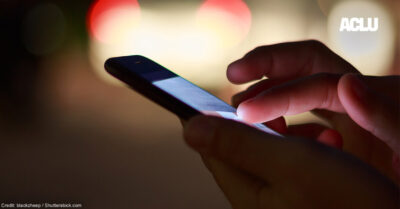Cell Phone Privacy
The ACLU works in courts, legislatures, and communities to defend and preserve the individual rights and liberties that the Constitution and the laws of the United States guarantee everyone in this country.

The Latest
Explore More
What's at Stake
Cell phones and other wireless electronic devices are vital communications tools that have become necessary for full participation in modern life. But they are also powerful tracking devices that can be used to infringe on individual privacy.
Knowing where a person’s phone is located can reveal sensitive information, like when they go to the doctor or psychologist, what political activities they engage in, who they spend time with, and where they sleep at night. Law enforcement agencies can often obtain this personal information without ever getting a warrant from a judge. The federal government also invokes powerful surveillance authorities to collect this information and more, including our call records, contact lists, and even the contents of our text messages and calls.
The ACLU works to ensure that cell phone data is protected against unjustified disclosure. We advocate in courts, Congress, and state legislatures to make sure that law enforcement is required to comply with the Fourth Amendment’s warrant requirement before obtaining cell phone data from service providers or tracking phones directly using Stingray devices, also known as “cell site simulators.”
Our work in this area includes public records requests, friend-of-the-court briefs, and legislative advocacy. We also litigate lawsuits challenging the constitutionality of the government’s invasive surveillance programs, advocate for increased transparency around phone companies’ provision of this information to the government, and encourage tech companies to employ technologies that protect their users’ privacy.
Cell phones and other wireless electronic devices are vital communications tools that have become necessary for full participation in modern life. But they are also powerful tracking devices that can be used to infringe on individual privacy.
Knowing where a person’s phone is located can reveal sensitive information, like when they go to the doctor or psychologist, what political activities they engage in, who they spend time with, and where they sleep at night. Law enforcement agencies can often obtain this personal information without ever getting a warrant from a judge. The federal government also invokes powerful surveillance authorities to collect this information and more, including our call records, contact lists, and even the contents of our text messages and calls.
The ACLU works to ensure that cell phone data is protected against unjustified disclosure. We advocate in courts, Congress, and state legislatures to make sure that law enforcement is required to comply with the Fourth Amendment’s warrant requirement before obtaining cell phone data from service providers or tracking phones directly using Stingray devices, also known as “cell site simulators.”
Our work in this area includes public records requests, friend-of-the-court briefs, and legislative advocacy. We also litigate lawsuits challenging the constitutionality of the government’s invasive surveillance programs, advocate for increased transparency around phone companies’ provision of this information to the government, and encourage tech companies to employ technologies that protect their users’ privacy.




